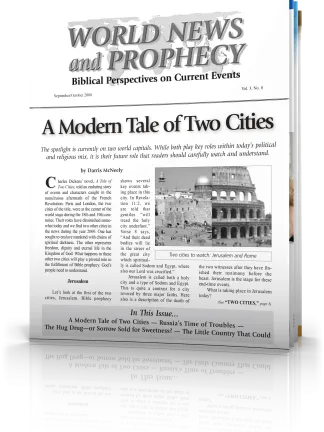In Brief... Realignment of Nations and Shifting Sovereignty
With a proposal simply titled "Peace," reformers in the UN want to supplant national sovereignty through a UN standing army.
With a proposal simply titled "Peace," reformers in the UN want to supplant national sovereignty through a UN standing army. Such a force would have a more legitimate presence in situations such as Kosovo last year-widely perceived to be a thinly cloaked U.S. action that used NATO and the UN for its national objectives.
Armies have to be financed and, typically, governments raise revenues through taxation. The "Tobin Tax" on all international financial institutions, payable to the UN's coffers, was proposed five years ago.
Globalization is a common byword used by proponents of UN power. What they advocate is nothing short of a one-world government-an idea applauded by many, so long as they would control the newly generated center of power. Of course, it's roundly opposed by all sovereign powers that see themselves losing self-determination. Not the least of the opponents is the U.S., current host of UN headquarters.
The proposal might seem laughable-were it not for the fact that Bible prophecy indicates that a world government will be forged at the end of the age. The dynamics of weak nations pushing for it for their gain, and strong nations opposing it, because of their potential loss, show the reality of what forces will come to play in the fulfillment of prophecy. Nations will come together when they need to-or are forced to do so.
In a related development, signs point to a pullout by U.S. troops from Kosovo, bogged down in centuries-old ethnic conflict that some believe was not lessened by NATO's incursion.
The mood in the U.S. is, "Get out before American blood is shed." Should U.S. soldiers come home in body bags, there will be no stopping a U.S. pullout. With NATO fractured, Europe would be the logical power to step into the gap.
Will the Europeans be forged into a sovereign power, simultaneously diluting the sovereignty of the individual members, in a scenario similar to that proposed by UN reformers? In a little noticed development at the EU summit in Portugal in June, "the EU agreed to form a 5,000-strong police force by 2003 that could be deployed to spots in need of civil authority."
The force would have a 1,000-man contingent that could be deployed within 30 days. The EU "plans to assemble a 60,000-strong peacekeeping force over the next three years as well to handle a much wider array of tasks."
As could be expected, not all EU members agree on its purpose or function. Some states want to see it used to strengthen NATO, while at least France would like to see it replace the American-dominated NATO. "Regardless of how it eventually looks, the Union is slowly building itself a real military arm. Brussels just took a big bite out of national sovereignty." ("Millennium Madness at the United Nations," by Phyllis Schlafly, August 9, 2000, Copely News Service; "European Police Force Dilutes Sovereignty of EU States," 2000, WNI, Inc.)




